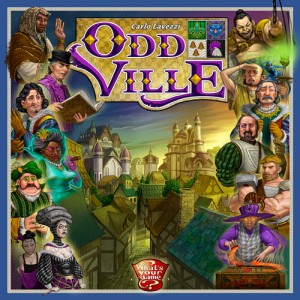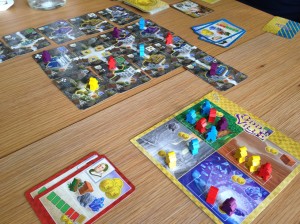Review: Oddville
Posted by James (admin) on December 3rd, 2012
Oddville is a eurogame with a city building theme and a very compact game design. By that, I don’t mean its physical playing-size on the table; instead, I mean that the game mechanics are neatly compressed. As a result, Oddville contains a clever, inventive design with more game than you may expect from a relatively short game.
During the game player’s gain resources, money and characters as well as construct buildings so they can score the most victory points (VPs). The game ends as soon as any player places their 6th worker in the city.
Each player has their own deck of 4 action cards. On their turn, a player can play 1 action card which allows them to either gain the cash shown, or gain 1 of the resources shown, or gain 1 building from the 6 building cards on display (the card affects the price). The cards range from strong to weak and the player gets these cards back once they have used all 4, or they can spend cash to get all used ones back (but the more cards still hand, the greater the cost).
When a player chooses to gain one of the resources on their action card, they place one of their workers on the lowest market price for that resource (which are limited in number) and pays the price. The worker on the board shows the player has that resource until they spend it when building. The game scales with 2 players as there are fewer cheap resources available.
When a player chooses to gain a building, their action card determines which of the 6 buildings on display are free and which will cost cash – the ones on the left (the oldest) are the ones most likely to be free. This sort of mechanic is in other games (like Gloria Mundi) and I like it because it makes newly added buildings (added to the right-end of the row) more expensive. If a player uses their action card to gain cash, they take a building card from the top of the deck because the back of the building cards show the 1 gold piece each.
Major bonuses include cash and resources, but can also allow the player to take the top-most character from the guild with the matching crest as their new building. Characters give their owners special abilities such as converting a cash card into a building card (which is done by flipping the cash card over as the buildings are on the other sides). If a player needs to gain a character and there are no more left of the required guild, all players must return all the characters of that guild to the pile first. This seems like a nice extra element to the gameplay and efficient too as it requires few characters.
As well as bonuses, the player places one of their workers on their newly built building too – they will earn VPs from the buildings they own at the end of the game. The VPs are scored in lots of different ways and the icons on them are very clear. Some give specified VPs, some give VPs for neighbouring buildings, for buildings in the same row or column, for all buildings with specific guilds marked on them in the city, etc.
 Overall, I thoroughly enjoyed Oddville as there are lots of interdependent elements that you need to balance and think about (plus you must cope with your opponents’ actions/choices too), yet it remains a simple game too. The multi-use action cards worked well – I like games where cards can be used for multiple purposes as it creates interesting decisions about how to use your hand best. Plus, I never felt I wasted a turn because I didn’t have the ‘right’ action card, but could adapt my plans based on my situation and still and get some value out of my action cards.
Overall, I thoroughly enjoyed Oddville as there are lots of interdependent elements that you need to balance and think about (plus you must cope with your opponents’ actions/choices too), yet it remains a simple game too. The multi-use action cards worked well – I like games where cards can be used for multiple purposes as it creates interesting decisions about how to use your hand best. Plus, I never felt I wasted a turn because I didn’t have the ‘right’ action card, but could adapt my plans based on my situation and still and get some value out of my action cards.
The resource market is subtly clever – some resources are more scarce than others (appearing on fewer action cards) so gaining these can be challenging so gaining them from constructing buildings can also be important. However, each resource has limited spaces that cost 0 or 1 gold (unlimited costing 2 gold each) so even the more common resources are fought over as no-one likes paying more cash for them than another player.
When it comes to buildings, there are some really interesting decisions to balance as you need to gain building cards that match your resources, plus they need to fit onto the city layout, plus you want to place them so they will earn you bonuses, plus you want to place them so they will score lots of VPs for you (and not for your opponents). That’s a lot to balance and its a lot of fun. In addition to that, the buildings you place early on can also influence your decisions later as you try to construct further buildings that will make your other buildings score more too, i.e. building in a column when you own a building that gains VPs based on buildings in the same column. There’s plenty of tension too as you hope your opponents don’t disrupt your plan by building in the space you want, buying the building card you want, or blocking the cheap resource you need – so there’s no time to feel secure.
The characters can be very influential as they deliver some nice bonuses and they’re quite varied too. So, players will actively try to build specific buildings to gain specific characters; however, the more players gain them, the more quickly the characters get returned to the pile too. I really liked that aspect. In our game, I thought I had the win until the last turn when one of my opponents beat me by taking a new character which meant I had to return mine and that made the difference between 1st and 2nd place. Most annoying, but I had to admire a very good move.
There really weren’t any obvious downsides to the game. It might be nice if there were a few more characters so you played each game with a sub-set to create different mixtures each game, but that’s a wish list item in my mind and not an issue.
In the end, Oddville has a very interesting mix of eurogame mechanics with some new ideas too all compacted into a small space. It’s a light game (as all the game mechanics are simple) but with plenty to think about which is even more surprising as it is a relatively short game at around an hour. Many light city building eurogames have been released in the last couple of years and Oddville is top of my favourites, and I hope will become one of my favourite games overall.
James.
[Played with 4 players]



December 4th, 2012 at 2:57 pm
Bwa, and indeed, hahaha! 🙂
December 4th, 2012 at 3:01 pm
If you hadn’t guessed, Rick was the one who beat me on the last turn.
December 4th, 2012 at 10:18 pm
To be fair though, I think that’s an unlikely situation to crop up often. Iirc, the game ends immediately on the turn of the player that triggers it. I only managed to get an extra build action in because I had the one character that allows you to build on other players’s turns, and built a building with him that meant that colour character got exhausted causing you to turn yours in.
Still highly amusing, nevertheless!